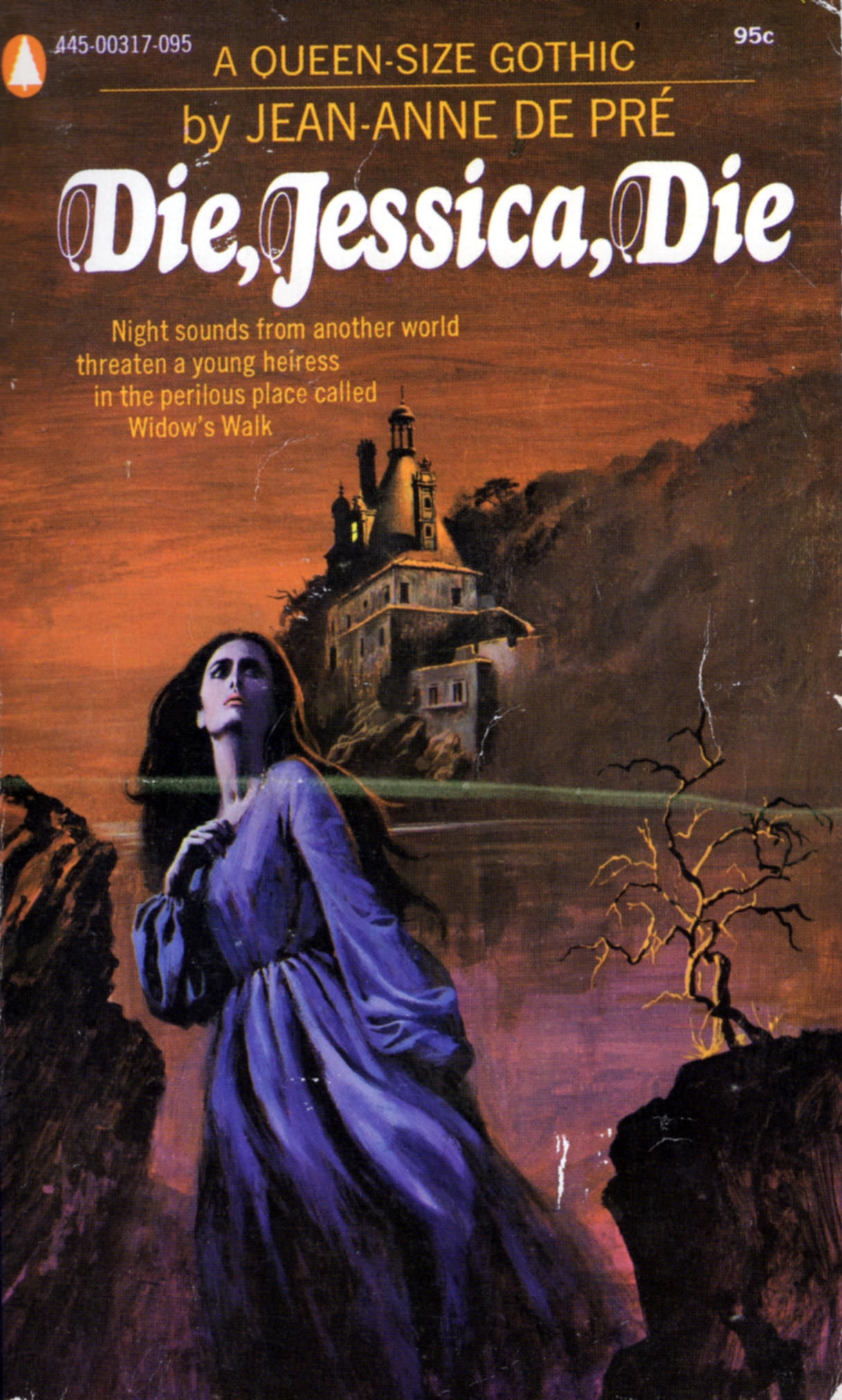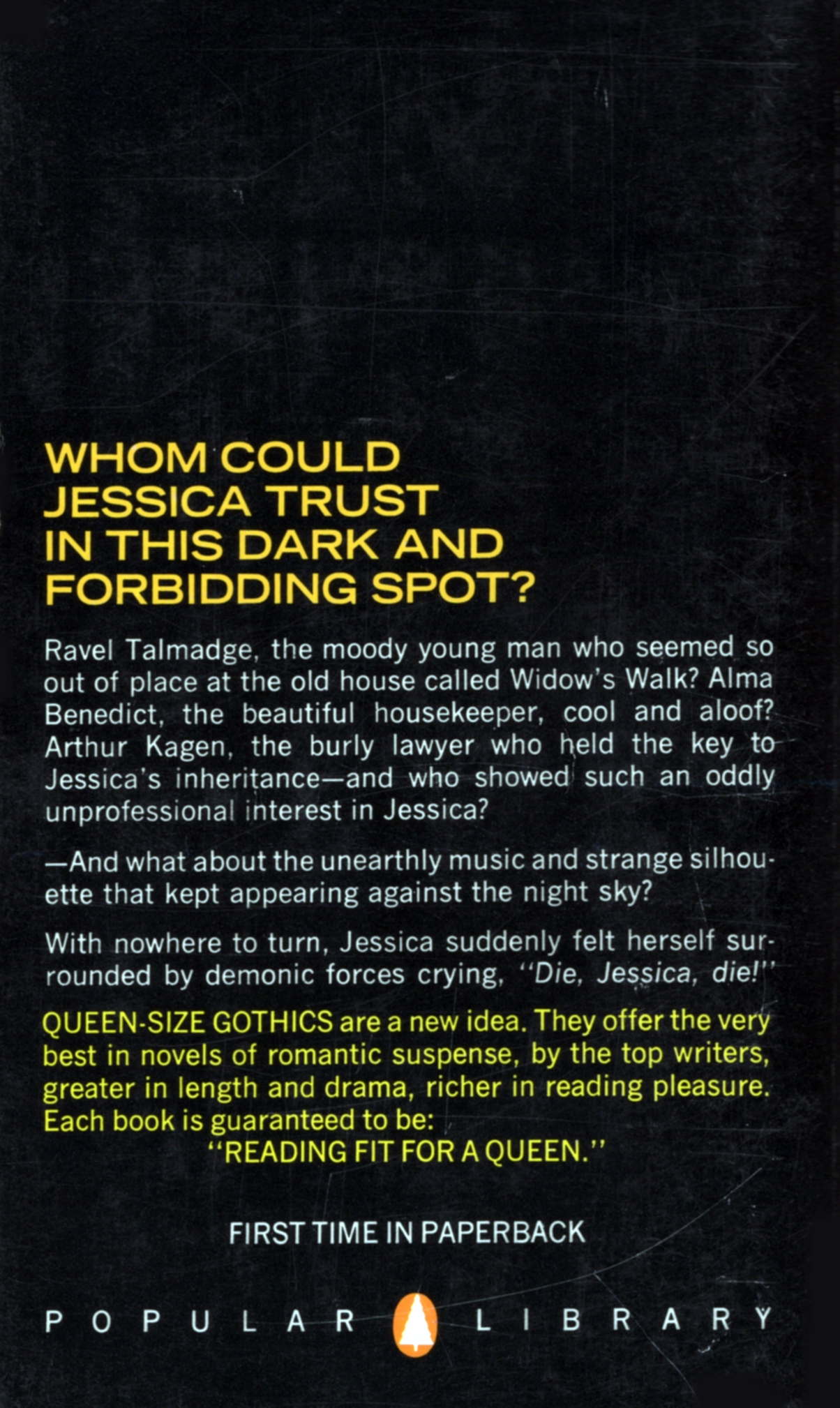
Die, Jessica, Die is a 1972 novel from the “Queen-Size Gothic” series. The series promotes itself as “greater in length and drama, richer in reading pleasure.” Presumably this appeals to readers who found mass-market gothic novellas of the 1960s and ‘70s too short and simplistic. In reality, the most “queen-size” thing about the series is thicker pulp paper (which makes 285 pages look more like 400) and a large font. Sometimes the plots are juicier than typical, but often they are as basic as any gothic romance paperback.
No exceptions here. Despite its alluring title and a narrator who promises much diabolical intrigue, there are no unconventional surprises.
As Jessica returns home after four long years at college, she finds her father’s mansion much-changed. There’s a new housekeeper she’s never met before, an attractive handyman roaming about, a strange doctor who administers tranquilizers at the first sign of distress, and a “burly” lawyer who may or may not be seducing Jessica for his own gain.
Worst of all, she learns right away that her father is dying. Scarcely before she can set down her luggage does he emit his dying breath. And with that breath is a deathbed clue to some mystery. Will Jessica solve the mystery before the conspirators kill her off and snatch away her inheritance? Now an orphan with no friends, who can she trust? Anyone??
To liven up the mystery, Jean-Anne de Pre places us in the historical period of the 1910s (a nice touch) and utilizes a narrator who suggests satanic influences are underfoot. As a tranquilized Jessica dozes through a vicious thunderstorm, she is struck by the presence of monstrous shadows lurking in the rain.
Though all this yummy build-up leads to a somewhat anticlimactic finale, it’s hard to deny that such tricks are effective at keeping the pages flying by and creating a desperate need to find out what happens next. The most intriguing mystery—a solution to the father’s dying riddle—is expertly held back until the absolute final pages. Again, answers are hardly as dramatic as the questions, but often the journey is more satisfying than the destination.
Like a drug, mass market gothic romances intoxicate with a suspense high and frequently conclude with a crash, leaving one feeling withdrawals. Even if this results in some bad reviews and disappointed readers, it seems to be an effective business model. The only way to return to that high is to buy another inexpensive paperback and start over again.

Of course, these gothic romances aren’t so cheap anymore. Scarcity of supply and a renewed demand in interest has brought up second hand prices. I paid over 3,000% the original price, and it was hardly in the best condition. At least I found a copy, though. This one seems particularly hard to find.
About the author…
“Jean-Anne de Pre” is one of the many feminine pseudonyms of Michael Avallone (1924-1999). As an Easter Egg to fans or a moment of brazen pomp, he dedicates this book
To those ladies who would have looked so fine in crinoline, calico and gingham—the Misses Edwina Noone, Priscilla Dalton and Dorothea Nile—three of the greatest Gothic writers of them all—and my very dear colleagues.
This is a cheeky dedication indeed since the talented “ladies” Noone, Dalton and Nile are all additional pseudonyms used by Avallone.
Cheeky only begins to describe Michael Avallone, who, according to his obituary, wrote 209 novels in his lifetime. He had a witty tongue and enjoyed lashing out at contemporaries and critics. He frequently spoke out against Stephen King, calling him a plagiarist of Robert Bloch novels, while expecting great recognition for his own hackneyed plots.
Avallone despised reviewers and editors, saying they were all “failed writers” forced into a “consolation job.” Ouch! I feel personally attacked.
Despite his ego and unpopular personality, I do think he deserves more recognition. Especially knowing that he could produce perfectly entertaining novels in 3-4 weeks. Some he wrote in a single day, according to his wife Fran Avallone. While none of his books have endured critically, I’ve also yet to read one which didn’t enthrall me from beginning to end. More than ever, I recognize there’s a powerful talent merely in keeping my attention. His ability to do that with a mediocre plot perhaps only further showcases a writer’s mastery.
Keep the conversation going! SpookyBooky is on social media:
